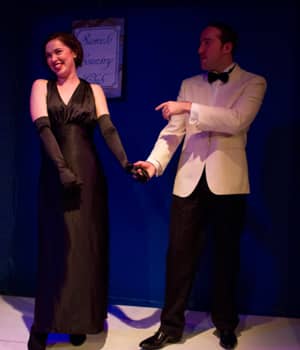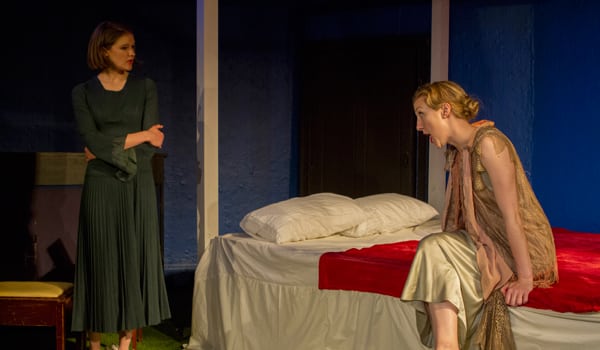A Naughty Night With Noël Coward
08/08/15
Old Red Lion Theatre, Islington
3 Stars
‘I’ve never had any ambition to do anything other than be in the theatre. Perhaps in surgery, though. A doctor maybe. Or a surgeon. I’ve seen almost every major operation there is – I love watching operations. It might have something to do with the fact that people fascinate me most of anything in life.’ – Noël Coward
There are tensions in Coward’s writings that make him a more complicated, less immediately fully formed and unpredictable playwright than his immaculately contrived and maintained persona suggests. In fact the persona of ‘The Master’ was designed as much as anything to conceal and repel curiosity about those tensions and the details of his personal and artistic formation. If you put the early Cochran and Charlot reviews to one side then that first run of plays from Easy Virtue through the Vortex and culminating in Design for Living read like Bernard Shaw on benzedrine. They have an unsparingly economical and forensic quality that is both alarming and intoxicating. You have no sense of where the excavation of foibles and personality will end. Wit wobbles on the edge of cruelty, characters fragment towards breakdown, and no social norms go unscrutinised by that uniquely sceptical, glittering eye.
And then as the 20s shade into the 30s the wind shifts. The other side of Coward emerges more prominently, the side that ultimately was to take him into the Establishment as wartime patriot and cheerleader, cabaret star, Hollywood personality, chum of Churchill, the Mountbattens and the Queen Mum and the practitioner of a polished Art Deco style that yields Present Laughter and Blithe Spirit and other well made, consummately stylish but unthreatening light comedies. Private Lives stands as the pivot where both sides of his theatrical personality are on show in equal measure, and then at the end of his career, right at the end, that early corrosive Coward re-emerges, this time mocking himself, in A Song at Twilight.
It was therefore an apt choice to put together two one-act plays that represent the two sides of Coward’s craft so sharply, but a risky one too because very different styles of acting are required to bring off each of them equally well.
We Were Dancing is one of the ten short plays that form the sequence Tonight at 8.30, originally written as vehicles for Coward and Gertrude Lawrence to perform in different combinations. It is one of the weaker pups of the litter and depends for its success on strong and stylish performances in the lead roles to carry the thin scenario. The setting is a country club on a South Sea Island – the sort of place evoked in short stories by Somerset Maugham. At a dance a married woman, Louise (Lianne Harvey) falls for Karl (James Sindall), a glamorous commercial traveller in shipping, and they propose to leave together much to the conventional outrage of husband Hubert (John MacCormick) and his sister Clara (Beth Eyre); but as dawn breaks the magic of the moment fades and they realise they have nothing in common with one another.
 There is nothing much wrong with the technical acting from this cast of young recent graduates, but for this particular play there is little stylistically right about it either. For this flimsy confection to work you need actors approaching middle age who can conjure up the fear of ageing and the desperate desire to live in the moment that goes with it. There is none of that here in the lead roles, and the bluster of the representatives of conventional morality is not much more convincing either. Coward’s ‘stuffed shirts’, as in Private Lives, really merit committed portrayals, for otherwise there is no foil from which the free spirits can playfully and wittily recoil. Sindall is the one actor here who grasps the true Coward style: he finds the right blend of aloofness and precision of language and pace, without falling into the trap of a direct imitation of Coward himself. He succeeds in showing that if you find the right groove and speak Coward’s lines with absolute faithfulness to text and rhythm, then a sudden alchemy occurs – artifice begins to sound quite natural.
There is nothing much wrong with the technical acting from this cast of young recent graduates, but for this particular play there is little stylistically right about it either. For this flimsy confection to work you need actors approaching middle age who can conjure up the fear of ageing and the desperate desire to live in the moment that goes with it. There is none of that here in the lead roles, and the bluster of the representatives of conventional morality is not much more convincing either. Coward’s ‘stuffed shirts’, as in Private Lives, really merit committed portrayals, for otherwise there is no foil from which the free spirits can playfully and wittily recoil. Sindall is the one actor here who grasps the true Coward style: he finds the right blend of aloofness and precision of language and pace, without falling into the trap of a direct imitation of Coward himself. He succeeds in showing that if you find the right groove and speak Coward’s lines with absolute faithfulness to text and rhythm, then a sudden alchemy occurs – artifice begins to sound quite natural.
Despite Stephen Sondheim’s recent strictures, this is a point that also applies to and validates Coward’s music. Tom Self at the piano sings a couple of the most famous songs as overture and scene-change interlude respectively. Of course the songs are self-consciously brilliant or sentimental, but they can still be marvellously evocative of mood and dramatically successful on stage if done as exact exercises in rhetorical performance. ‘Dance, Dance, Dance, Little Lady!’ lacked the obsessive attack and faster tempo needed to set us up for the first play; but his rendition of ‘The Party’s Over Now’ caught exactly the right tone of world-weary, knowing, wistful regret to glide us into the darker territory of the second and ‘The Better Half’.
This play is a recent re-discovery. Performed only once in 1922, it was thought lost until 2007 when researchers found a copy in the archive of the Lord Chamberlain’s Office. It is truly a real find – a vintage example of Coward’s early and most exciting phase of writing.
What strikes you immediately is the ruthlessly pared-down writing. The dialogue has a reckless, untrammelled quality and a determination to leave no layer of self-deception unexposed and no comforting complacent illusion in place. Sometimes it is done with genuine wit as in the remark that too often ‘understanding and forgiveness are draped around the house like tired Christmas decorations’. But mostly it is done with great economy of means – you can see why towards the end of his life in the 1960s both Orton and Pinter held Coward in real respect, and he for them.
The play is a three-hander. Alice (Tracey Pickup) is unhappily married to David (Stephen Fawkes), who has much more in common in temperament and interests with Alice’s best friend Marion (Beth Eyre). The action takes place in Alice’s bedroom – a nifty scene change done by the cast themselves during the interlude music, and the detailed period result reflecting due credit on Oliver Daukes (designer) and Andrea Marsden (set dresser). Alice is bored with herself and her marriage and perceives that her husband and best friend are far too high-minded to begin an affair. She tries to precipitate change by revealing that she herself has not had any such scruples. The play pirouettes delightfully around the truth or fiction behind these claims and makes great play of how traditional morality manages to combine self-deception and self-congratulation. Director Jimmy Walters correctly sets a furious pace and there is lots of movement and physical interaction that is naturalistic rather than stylised. This time the young actors are fully in tune with the writing and take all the wonderful opportunities given to them by the writer. The play embodies Coward’s claim that a short play has ‘a great advantage over a long one in that it can sustain a mood without technical creaking or over padding’.
The Better Half deserves a much wider audience, and would make a wonderful match for Rattigan’s The Browning Version, which has never really found an effective partner play in either Harlequinade or David Hare’s South Downs. Both plays expose comforting illusions about married life, but with very different outcomes and contrasted tone in the writing – a fine potential double-bill in the making.
One final cavil: ‘A Naughty Night with Noel Coward’ is a truly wretched title to choose for this theatrical night out. It smacks of cheap titillation – the world of Frankie Howerd and the Carry-On Films. While Coward professed to write light comedies he did not write vulgar or obvious ones. A better title, perhaps, would be Duets for Three, given that in each case there are three partners involved where there can only in the end be two – a subject for laughter to be sure, but also for irony and pathos.
In sum, this is a thoroughly absorbing evening in the theatre with high professional values across the board, but where the real rewards and revelation come in the second half.
A Naughty Night With Noel Coward runs until 29th August 2015.

